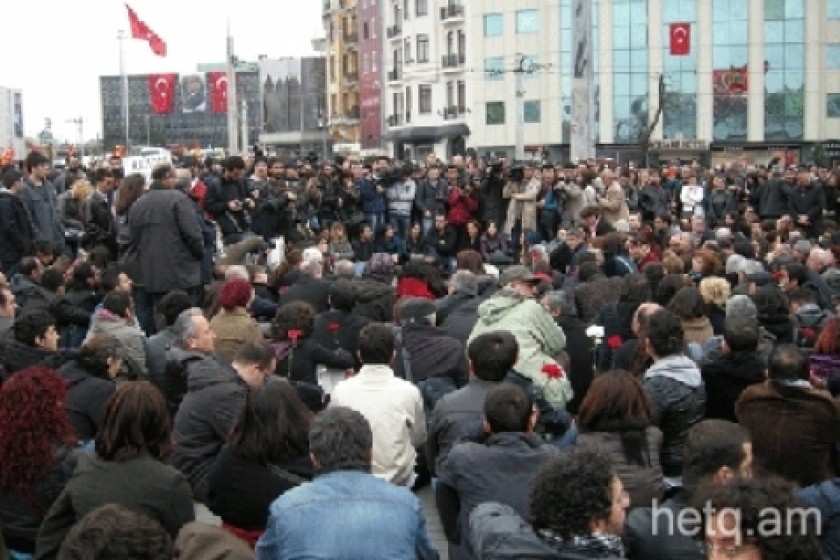
Turkey Tries its Hand at TV Diplomacy
As of January 1, 2009, the Turkish State Radio and TV Company (TRT) began to broadcast a 24 hour Kurdish language station (TRT 6) for the first time in its history. While viewed as a mostly positive step, it was late in coming in terms of safeguarding Kurdish minority rights. It is common knowledge that up till 1991the use of Kurdish was generally prohibited in Turkey. In 2002, the ban on Kurdish language broadcasts was lifted but in practical terms the creation of private airwaves was all but impossible until now.
Under pressure by the European Union to safeguard the minority rights of the Kurdish community, Turkey’s TRT began broadcasting a 30 minute weekly program in Kurdish in 20004 but the initiative came under fire for its poor quality and content. Presently, in Turkey, one can view 10 Kurdish language TV stations broadcast from Iran and Iraq.
Most Kurds in Turkey however prefer “Roj TV”, a satellite station based in Belgium that is considered to be the publicity outlet for the Kurdish Workers Party (PKK). Analysts believe that by creating the new Kurdish TV station the Turkish government seeks to attract viewers away from “Roj TV” and its extremist political propaganda. In response, the PKK has already called for a boycott of the TRT-6 station, labelling it a tool of “traitors” that will lead to assimilation.
The Kurdish extremists claim that the station merely seeks to disseminate anti-PKK propaganda in the Kurdish language and thus ensure Turkey’s positive image for membership within the European Union and to rally Kurdish votes for the upcoming March local elections since, according to most accounts, the ruling Turkish party has lost the support of the Kurdish community.
Turkish analyst Nihat Ali Ozkan shares the view that the government, by launching the new station, seeks to provide an alternative to “Roj TV”, which supports the Kurdish separatists. “At the same time, Turkey, under pressure from the European Union, is taking steps to safeguard the rights of the Kurds to preserve their cultural identity.”
Officials from the European Union are closely following these developments in Turkey and positively view the launching of the Kurdish language station while at the same time expressing the hope that it doesn’t turn into a tool for government propaganda.
The ruling “Justice and Development Party” has given assurances that TRT-6 will never be used as a propaganda mouthpiece and that, on the contrary, it will sincerely seek to fulfil the demands of the Kurdish minority.
Turkish Prime Minister Erdogan has stated that the Kurdish station will bolster unity and improve democracy in the country, paving the way for new positive steps in the future. Well-known Turkish political commentator Cengiz Kantar, during an interview with Reuters, expressed the view that TRT-6 wouldn’t have much political impact on the Kurdish community.
Kurdish singer Rojin, known for her Kurdish nationalistic ballads, performed at the TRT-6 launching ceremonies. In the past several stations were fined for broadcasting her performances.
From now on, Rojin and other singers know for their nationalist-inspired works will have the opportunity to appear on the TRT-6 TV screens. According to some reports, TRT-6 will also invite Kurdish political dissidents to appear on its programs.
The Kurdish press underlines the fact that since its inception official Turkish state policy has been to deny the existence of the Kurdish people and its national identity. The use of the Kurdish language still leads to problems till today. Kurdish children aren’t afforded the opportunity to be taught in their mother language in schools.
Kurdish villages can’t have Kurdish names and there are even problems associated with people having Kurdish names. Recently, a young Kurdish child travelling from Germany wasn’t allowed to enter Turkey just because he had a Kurdish name.
During the past month, statements made in Kurdish within the halls of the Turkish parliament were labelled as an “unknown language”. Several political activists of the pro-Kurdish Democratic Society Party were investigated for their public use of the Kurdish language.
Nevertheless, there are elements within the Kurdish minority in Turkey that positively welcome the new TV station. They believe that the station will allow for an increase in the knowledge of the language. Ankara also intends to use TV diplomacy to garner the confidence of the Armenian minority community in Turkey.
The Sabah newspaper reports that an Armenian station will begin broadcasting by the end of 2009. TRT has already begun the preparatory work in this regard. In advance of the TV station, radio broadcasts in Armenian are slated to start this February and an official website will be launched as a trial run for the TV station.
The TV broadcasts will include performances of well-known Armenian singers and renditions of Armenian songs by the Kardes Turkuler and other Turkish groups. The Armenian TV station will also report on important developments occurring in Turkey and Armenia. The new satellite station will be staffed with Armenians and will cover issues of concern to Armenians, residing in Armenia as well as Turkey.
 Videos
Videos Photos
Photos
Write a comment